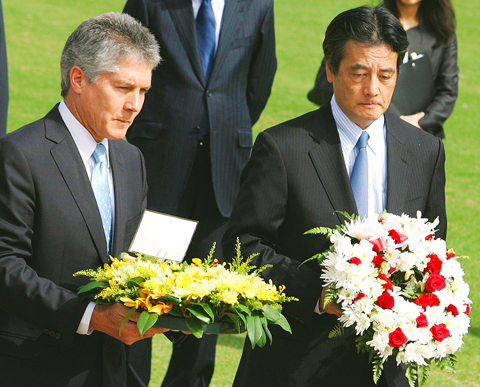The Japanese foreign minister said yesterday it was “unfortunate” Australia had threatened legal action against Tokyo’s controversial whaling program, but he did not believe it would hurt ties.
“It’s very unfortunate the Australian side has indicated it will take action in an international court,” Japanese Foreign Minister Katsuya Okada told reporters.
“Should action become a reality, Japan will seek to represent its case with the IWC [International Whaling Commission] that its activities are legal,” he said.

PHOTO: AFP
He said the issue should not affect relations between the two countries.
Okada met with his Australian counterpart, Stephen Smith, yesterday for diplomatic talks that were overshadowed by Australian Prime Minister Kevin Rudd’s threat to take Japan to court over its Southern Ocean whaling.
Smith said Australia remained hopeful of a diplomatic solution, but reiterated Rudd’s vow to seek arbitration in the International Court of Justice if negotiations failed.
He said Australia would push a proposal at the IWC for whaling to be phased out in the Great Southern Ocean over a “reasonable period of time.”
“And that is a position that we will put to the International Whaling Commission in the very near future, potentially as early as tomorrow [today],” Smith said.
Rudd on Friday bluntly warned Tokyo, a major trading partner and top export market, it had until November to reduce its whale catch to zero, or face action in the International Court of Justice.
Australia, along with New Zealand, has consistently opposed Japan’s killing of hundreds of whales each year, which it carries out via a loophole in an international moratorium that allows “lethal research.”
Okada is the first official from the new Japanese administration to visit Australia and emphasized before leaving Tokyo that their whaling activities were legal, carried out in public waters and in accordance with international conventions.
He and Rudd had a “frank discussion on whaling” in Sydney on Saturday and a spokesman said Japan still hoped for a diplomatic agreement on the issue.
For the past six years Japanese harpooners have been pursued by militant environmental activists from the Sea Shepherd Conservation Society and this year clashes between them have been particularly fierce.
Okada and Smith jointly condemned the violence, which has seen a Sea Shepherd powerboat sunk and resulted in the detention of one of their activists.
A group of about 10 protesters from the Sea Shepherd Conservation Society earlier confronted the pair as they laid remembrance wreaths in Perth’s war cemetery in a silent protest against the annual whale hunt.

Former Nicaraguan president Violeta Chamorro, who brought peace to Nicaragua after years of war and was the first woman elected president in the Americas, died on Saturday at the age of 95, her family said. Chamorro, who ruled the poor Central American country from 1990 to 1997, “died in peace, surrounded by the affection and love of her children,” said a statement issued by her four children. As president, Chamorro ended a civil war that had raged for much of the 1980s as US-backed rebels known as the “Contras” fought the leftist Sandinista government. That conflict made Nicaragua one of

COMPETITION: The US and Russia make up about 90 percent of the world stockpile and are adding new versions, while China’s nuclear force is steadily rising, SIPRI said Most of the world’s nuclear-armed states continued to modernize their arsenals last year, setting the stage for a new nuclear arms race, the Stockholm International Peace Research Institute (SIPRI) said yesterday. Nuclear powers including the US and Russia — which account for about 90 percent of the world’s stockpile — had spent time last year “upgrading existing weapons and adding newer versions,” researchers said. Since the end of the Cold War, old warheads have generally been dismantled quicker than new ones have been deployed, resulting in a decrease in the overall number of warheads. However, SIPRI said that the trend was likely

BOMBARDMENT: Moscow sent more than 440 drones and 32 missiles, Volodymyr Zelenskiy said, in ‘one of the most terrifying strikes’ on the capital in recent months A nighttime Russian missile and drone bombardment of Ukraine killed at least 15 people and injured 116 while they slept in their homes, local officials said yesterday, with the main barrage centering on the capital, Kyiv. Kyiv City Military Administration head Tymur Tkachenko said 14 people were killed and 99 were injured as explosions echoed across the city for hours during the night. The bombardment demolished a nine-story residential building, destroying dozens of apartments. Emergency workers were at the scene to rescue people from under the rubble. Russia flung more than 440 drones and 32 missiles at Ukraine, Ukrainian President Volodymyr Zelenskiy

Indonesia’s Mount Lewotobi Laki-Laki yesterday erupted again with giant ash and smoke plumes after forcing evacuations of villages and flight cancelations, including to and from the resort island of Bali. Several eruptions sent ash up to 5km into the sky on Tuesday evening to yesterday afternoon. An eruption on Tuesday afternoon sent thick, gray clouds 10km into the sky that expanded into a mushroom-shaped ash cloud visible as much as 150km kilometers away. The eruption alert was raised on Tuesday to the highest level and the danger zone where people are recommended to leave was expanded to 8km from the crater. Officers also